Dental Implant in Lithuania
Search and Compare the Best Clinics and Doctors at the Lowest Prices for Dental Implant in Lithuania
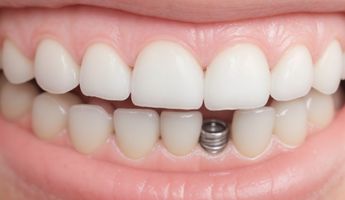
Find the best clinics for Dental Implant in Lithuania
No clinics available

MedLT, can be found in Laisves, Vilnius, Lithuania and offers its patients Dental Implant procedures as well as 74 other procedures, across 10 different procedure categories. At present, there is no pricing information for Dental Implant procedures at MedLT. The pricing information is quite specialised, so it's only available on request. The lead specialist at the Hospital will be carrying out all the treatments, and MedLT is not accredited by any recognised accreditations institutions.
- Home
- Lithuania
Compare Before & After Photos of _procedure_photos.phpDental Implant

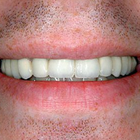
Front view


Front view
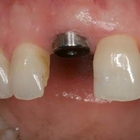
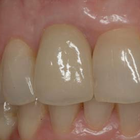
Front view
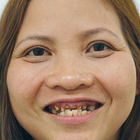

Front view


Front view
WHY US?
At Medijump, we're making medical easy. You can search, compare, discuss, and book your medical all in one place. We open the door to the best medical providers worldwide, saving you time and energy along the way, and it's all for FREE, no hidden fees, and no price markups guaranteed. So what are you waiting for?

Free

Best Price

Widest Selection

Risk-Free
What you need to know about Dental Implant in Lithuania
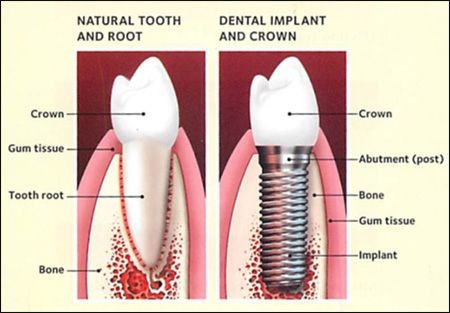
A dental implant is a medical device that provide support to artificial teeth. It's surgically placed into the jaw to act as a replacement for the root of a missing or damaged tooth, which in turn serves to hold a replacement tooth or bridge. It functions and looks much like a real tooth, restoring your ability to chew and improves your overall appearance. Dental implant surgery is considered as a better alternative to dentures or bridgework that does not fit well. It also offers a great option for people when they do not have enough natural teeth roots left to build denture or bridgework replacements.
Since dental implants eventually fuse with your jawbone over the span of several months, it won’t make noise, slip, or cause bone damage the way dentures or bridgework might. Dental implants also enable natural speech, look and feel like your own teeth, make eating easier, and improves your appearance. However, the surgery may involve several stages, and, in some cases, it may require two separate visits to the clinic to complete. Ensure to look for a specialist in a reputable clinic for the best results.
What is the cost of Dental Implant in Lithuania?
Price differences abound in Lithuania for Dental Implant based on the clinic, the proficiency of the surgeon, and the individual requirements of the patients. It's essential to realize that dental insurance usually doesn't cover the entire bill for this treatment, though it might cover a part. Several dental clinics provide finance schemes or payment alternatives to assist in easing the financial burden. For more precise cost estimates, reach out to your dental service provider or a nearby clinic.
What does a Dental Implant Procedure Involve?
Dental implant surgery generally requires several stages. Each stage may be performed under general or local anesthetic. The first stage is removing the damaged tooth. Then, if your jawbone is too soft or not thick enough, your dentist may perform bone grafting to create a more solid base for the implant. The bone graft may be natural (taken from another part of your body) or synthetic (a bone-substitute material). If you only need minor bone grafting, the implant surgery can be performed on the same day. However, if you need a significant amount of bone graft, the implant surgery may have to be postponed until the transplanted bone grows enough new bone to support the dental implant.
The next stage after the damaged tooth removal and bone graft (if you need one) is placing the dental implant. To do this, your dentist makes an incision to expose the bone and puts the metal implant post deep into the bone. At this stage, you will still have a gap where your tooth is missing. Your dentist will place a temporary denture for appearance. Once the metal implant post is placed, osseointegration begins. This is a process where the jawbone grows into the surface of the implant and can take several months to complete. After osseointegration is complete, your dentist will place the abutment, which is a small connector post that will hold your new tooth. The final stage, after the abutment is placed, is placing the crown, which is the tooth-looking part. You can choose between a removable crown and a fixed crown.
How Long Should I Stay in Lithuania for a Dental Implant Procedure?
The length of your stay in Lithuania for a Dental Implant depends on numerous considerations like the intricacies of the procedure, the quantity of implants required, and your personal recovery process. Each stage of dental implant surgery is done in separate appointments. After each appointment, you should be able to leave the hospital or clinic right away. However, you should stay in Lithuania for at least 2 weeks for completion of the work, the initial recovery time, and follow-up checkups.
What's the Recovery Time for Dental Implant Procedures?
The recuperation duration following a Dental Implant or dental implant operation can widely vary and is shaped by multiple aspects. Initial healing of the tissue might require only a handful of days, but complete osseointegration (the fusion of the implant with the jawbone) generally spans several months. This window could be extended for patients requiring auxiliary procedures such as bone grafts, or those with prevailing health issues that may impede the healing process.
Post-procedure, it's not unusual to experience a degree of discomfort, which could manifest as minor pain, swelling of your gums and face, skin and gum bruising, and slight bleeding. Such symptoms are a standard phase of the recovery process and should alleviate within a fortnight. In this interim, it's advisable to stick to a soft diet to not overload the implant site with undue pressure. Any strenuous physical exertion should be put off to circumvent potential complications.
Maintaining excellent oral hygiene is paramount to facilitate healing and stave off infection. Regular brushing and flossing, being particularly gentle around the surgical area, coupled with rinsing your oral cavity with warm saline water, can contribute to keeping the region hygienic.
What sort of Aftercare is Required for Dental Implant Procedures?
After each stage of surgery, you may have to eat soft foods. Since you may experience swelling, bruising, pain, and minor bleeding, your dentist will prescribe pain medications or antibiotics to help ease your discomfort. During your recovery period, you need to avoid smoking as it can contribute to implant failure and complications.
No special care is required for dental implants. Nonetheless, you need to practice good oral hygiene in order to maintain the implant and your remaining natural teeth. Make sure to brush your teeth twice a day, floss daily, and rinse your mouth with an antiseptic mouthwash. You also need to see your dentist regularly and avoid damaging habits, such as chewing hard items.
What's the Success Rate of Dental Implant Procedures?
The efficacy of Dental Implant, alternatively referred to as dental implants, in Lithuania, is typically impressive, boasting effectiveness percentages as high as 98% in some studies. This positions dental implants as one of the most reliable procedures within dental care's realm. Nevertheless, it's worth mentioning that the success rates might fluctuate, influenced by several factors.
The patient's overall health is a key determinant of the thriving outcome of a dental implant procedure. Individuals exhibiting optimal health usually witness higher success rates. Pre-existing health issues like diabetes, osteoporosis, and periodontal ailments can theoretically impact the efficacy of the implant.
Additional contributing factors to the success rate encompass the quality and abundance of the individual's bone structure. Patients boasting plentiful, healthy bone are ordinarily the perfect candidates for dental implants. However, those who have experienced bone loss might need to undergo a bone grafting procedure before the implant procedure. This step can provide a robust base for the implant and enhance the chances of a successful result.
Are there Alternatives to Dental Implant Procedures?
If you are not a candidate for dental implant surgery, or you simply do not want to undergo the procedure, you can opt for the alternatives. The alternatives include:
- Mini dental implants, which is a small type of dental implants. The structure is similar to regular dental implants, but are somewhat smaller in size. Unlike regular dental implants, dentists can often place mini implants only in one visit using local anesthesia. You may also be able to use your new teeth on the same day.
- A same-day implant is essentially similar to traditional dental implants. However, your dentist performs the whole process in just one day, skipping the process of wound healing and osseointegration.
- Implant-supported dentures or All-on-4 is an alternative if you need to fix a complete upper or lower set of teeth. During this procedure, four to six implants are placed into your jawbone as a base to attach and stabilize your denture.
What Should You Expect Before and After the Dental Implant Procedure?
Grasping what lies ahead before and post the Dental Implant can lessen potential worries and guarantee you are fully equipped for the upcoming journey. Prior to the procedure, your dental practitioner will conduct an all-inclusive dental assessment. This check-up may encompass dental X-rays and sophisticated 3D imaging to examine the status of your oral cavity.
The dental professional will also explore your medical history. If you're suffering from specific heart disorders or orthopedic implants, your dental practitioner might suggest antibiotics to avert infection. A personalized treatment blueprint, customized to your circumstances, will be constructed. This strategy takes into account factors like the amount of teeth you need substituted and the state of your jawbone. The procedure is typically carried out under local anesthesia to mitigate any discomfort.
Subsequent to the operation, experiencing slight unease is usual. You might witness inflammation of your face and gums, discoloration of your skin and gums, soreness at the insertion area, and insignificant bleeding. Your dental specialist will recommend medications to soothe these indicators. In case inflation, unease, or any other complications intensify in the days post-operation, it's crucial to reach out to your oral surgeon. Post-operation will require you to consume mushy foods as the operated site recovers. Moreover, you'll be guided to abstain from smoking, as it can hinder recovery and influence the triumph of the dental implant.
Following the positioning of the implant, the healing process, and fusion with the bone (osseointegration) transpire over an extended period. During this interval, maintaining robust oral cleanliness is vital. This involves frequent brushing, the use of dental floss, and cleansing with an antibacterial mouthwash. Periodic dental examinations are obligatory to track progress and confirm the well-being and effectiveness of the implant.
What are Potential Risks of Dental Implant?
Despite Dental Implant boasting remarkable effectiveness, it is, as any surgical operation, not without risks and potential difficulties. The chances of encountering these issues are often minute and irregularities are infrequent, yet it remains critical for patients to comprehend these possibilities before undertaking the procedure.
Complications and side effects may include:
- Implant failure
- Nerve injury
- Infection
- Sinus problems
- Damage to surrounding structures, such as other teeth or blood vessels
How long does a Dental Implant last?
The durability of a Dental Implant is heavily reliant on the individual's oral cleanliness and general wellbeing. Nonetheless, with appropriate upkeep and care, dental implants have the potential to stand the test of time. The titanium pillar inserted into the jawbone during surgery is crafted to be everlasting, while the dental cap fastened to the anchor may necessitate substitution every decade or decade and a half due to normal usage. Yet, with outstanding dental management and habitual screenings, the cap has the potential for lifelong endurance.
Whilst the information presented here has been accurately sourced and verified by a medical professional for its accuracy, it is still advised to consult with your doctor before pursuing a medical treatment at one of the listed medical providers
No Time?
Tell us what you're looking for and we'll reachout to the top clinics all at once
Enquire Now

Popular Procedures in Lithuania
Prices Start From $1

Prices Start From $1

Prices Start From $48

Prices Start From $1

Prices Start From $1

Prices Start From $11

Prices Start From $1

Prices Start From $45

Recommended Medical Centers in Lithuania for procedures similar to Dental Implant

- Interpreter services
- Translation service
- Religious facilities
- Medical records transfer
- Medical travel insurance
- Health insurance coordination
- TV in the room
- Safe in the room
- Phone in the room
- Private rooms for patients available

- Interpreter services
- Translation service
- Religious facilities
- Medical records transfer
- Medical travel insurance
- Health insurance coordination
- TV in the room
- Safe in the room
- Phone in the room
- Private rooms for patients available

- Interpreter services
- Translation service
- Religious facilities
- Medical records transfer
- Medical travel insurance
- Health insurance coordination
- TV in the room
- Safe in the room
- Phone in the room
- Private rooms for patients available

- Interpreter services
- Translation service
- Religious facilities
- Medical records transfer
- Medical travel insurance
- Health insurance coordination
- TV in the room
- Safe in the room
- Phone in the room
- Private rooms for patients available

- Interpreter services
- Translation service
- Religious facilities
- Medical records transfer
- Medical travel insurance
- Health insurance coordination
- TV in the room
- Safe in the room
- Phone in the room
- Private rooms for patients available

- Interpreter services
- Translation service
- Religious facilities
- Medical records transfer
- Medical travel insurance
- Health insurance coordination
- TV in the room
- Safe in the room
- Phone in the room
- Private rooms for patients available

- Interpreter services
- Translation service
- Religious facilities
- Medical records transfer
- Medical travel insurance
- Health insurance coordination
- TV in the room
- Safe in the room
- Phone in the room
- Private rooms for patients available

- Interpreter services
- Translation service
- Religious facilities
- Medical records transfer
- Medical travel insurance
- Health insurance coordination
- TV in the room
- Safe in the room
- Phone in the room
- Private rooms for patients available

- Interpreter services
- Translation service
- Religious facilities
- Medical records transfer
- Medical travel insurance
- Health insurance coordination
- TV in the room
- Safe in the room
- Phone in the room
- Private rooms for patients available

- Interpreter services
- Translation service
- Religious facilities
- Medical records transfer
- Medical travel insurance
- Health insurance coordination
- TV in the room
- Safe in the room
- Phone in the room
- Private rooms for patients available
Dental Implant in and around Lithuania
About Lithuania
Lithuania is an Eastern European country and is the largest and most populous of the three Baltic States. The country has a population of 3 million people, capital and largest city is Vilnius. There are only 3 Hospitals in Lithuania that are JCI accredited and all 3 can be found at the capital.
Lithuania welcomes an ever-increasing number of medical tourists each year, many of which travel for Dental Implant procedures. The biggest attraction of Lithuania has to be the cost. Once you are there it is very affordable to eat, drink and get around and the prices from private clinics for medical treatment are extremely competitive. Come from within Europe on a low-cost airline and you will probably pay for your treatment and your holiday for less than your procedure would have cost at home.
Popular Parts of Lithuania
Although Lithuania is one of the lesser known countries of Europe, the country is actually a beautiful destination. Lithuania is home to incredible castles, lakes, forests, and landscapes.
- Vilnius: The capital of Lithuania is a city of churches. It is a dreamy city especially under the golden glow of summer sun. The city is often referred to as one of the cheapest city breaks in Europe. Trendy bars, hills, beautiful architecture, and fascinating history all makes this city an amazing destination. Hot-air balloons above Vilnius are also an impressive sight.
- Kaunas is the second city in Lithuania and is probably the coldest city in the country. Most tourists’ attractions in the city are within walking distance, making it a pleasant city to explore. The street in Old Town is packed with interesting architecture and hidden attractions.
- Druskininkai is filled with health spa amenities. Tourists will find countless natural attractions such as mineral water and curing mud. The city offers many outdoor and leisure activities such as river canoeing, cycling, adventure park with rope obstacles, and ski.
- Nida is a peaceful fishing village. It is a popular destination for tourists looking for some downtime, it has beautiful panoramic views. It is also home to the highest moving sand dunes in Europe. The Dead Dunes is probably the most famous spot in Nida.
Weather and Climate in Lithuania
Lithuania is at its best in summer when the days are warm and the Baltic Sea is swimmable. The country is swarming with tourists during this season. Summer starts from June until August; the average temperature is around 20 °C during the day and 14 °C during the night.
Spring arrives late, usually starts in April and finishes in May. Spring makes the country look even more beautiful with blossoming flowers and cherry trees. The temperature is usually cool.
Autumn has many sunny days and adds more color to the country. Autumn starts in September and lasts for two months. The nights in autumn are chilly, and the temperature usually drops to 0.1 °C in late November.
Winter is especially cold with an average temperature of around -6.6 to -2.8 °C. Some winters can be even colder with the average temperature dropping as low as -20 °C.
Getting Around in Lithuania
Vilnius International Airport is the largest airport in Lithuania. It connects the country with European cities. The airport is the hub for air Baltic and Get Jet Airlines. Budget airlines such as Ryanair and Wizz Air also operate flights from this airport. Other international airports are Kaunas International Airport, Palanga International Airport, and Šiauliai International Airport. The airports in Lithuania do not serve domestic flights.
Vilnius airport taxis are available and can be found in front of the arrivals terminal. The taxis are comfortable and affordable. All taxis accept payment by cash or credit card, a journey to the city center should cost around 10 EUR to 18 EUR. The city bus is a more cost-effective option to travel to Vilnius. A single ticket costs 1 EUR and can be purchased on the bus.
Getting around in Lithuania by car is the best way if you wish to visit many destinations. Lithuanian roads are among the best in Eastern Europe. The country has four-lane highways connecting Vilnius, Kaunas, Klaipeda, Panevėžys, and Palanga.
Intercity buses dominate the system of Lithuanian public transportation. Buses link all major cities and smaller towns. Buses between big cities are very frequent and usually leave every 15 minutes. Bus tickets can be purchased in the bus station or directly from the bus driver. Trains in Lithuania are good value but rather slow. Riding a bicycle is a nice way to get around inside the cities. Most roads are kept in good condition. Bike hire is available across all major cities and several small villages.
Tourist Visas in Lithuania
Citizens of the European Union, the United States, Canada, Australia, and Britain are granted visa-free entry to Lithuania and may stay for up to 90 days. Other foreign nationals must apply and obtain a visa before entering Lithuania. It is advisable to contact the local embassy to check visa requirements for Lithuania.
Lithuania is part of the Schengen Area, those who already have a Schengen visa do not have to apply for a new visa to enter Lithuania. A passport valid for at least three months beyond the length of stay is required by all visitors.
Additional Information
- Local Currency: The local currency is the euro. Lithuania adopted the euro in 2015. 1 USD is equivalent to 0.88 EUR.
- Money & Payments: ATMs are available in cities and towns, even in small villages. Most banks will exchange your money, but the easiest way is to withdraw cash from an ATM. Most restaurants and hotels accept credit cards (mostly Visa, MasterCard, and American Express). Always make sure to carry cash for small purchases such as museums and markets. Tourists can tip 10% in restaurants, always tip with cash even if you’re paying by credit or debit card. Taxi drivers do not expect a tip, but it is common to add a couple of euros.
- Local Language: Lithuanian is the official language. English is widely spoken by younger generations. The older generations usually only have very basic English skills. Most people know Russian or at least very basic Russian. Polish is also understood in certain areas. German is also spoken in Palanga, Neringa, and other major cities.
- Local Culture and Religion: The predominant religion in Lithuania is Christianity; with around 77% of the population is Catholic. There are also small groups of Jews, Muslims, as well as other faiths.
- Public Holidays: As a Christian country, Lithuania celebrates Christian religious holidays such as Easter, Christmas Eve and Christmas. Lithuania has little traditions to celebrate its national patriotic holidays. The country hosts many annual and unique festivals all-year round. Galapagai Rock Music Festival in July, Palanga Smelt Festival in February, Vilnius Festival in June, Trakai Middle Age Festival in June, and Vilnius Film Festival in late March to early April.
Popular Searches
- Plastic Surgery in Thailand
- Dental Implants in Thailand
- Hair Transplant in Thailand
- Breast Augmentation Thailand
- Gastric Sleeve in Thailand
- Gender Reassignment Surgery in Thailand
- Laser Hair Removal in Bangkok
- Botox in Bangkok
- Dermatology in Bangkok
- Breast Augmentation in Bangkok
- Coolsculpting in Bangkok
- Veneers in Turkey
- Hair Transplant in Turkey
- Rhinoplasty in Turkey
- Stem Cell Therapy in Mexico
- Rhinoplasty in Mexico
- Liposuction in Mexico
- Coolsculpting in Tijuana
- Rhinoplasty in Korea
- Scar Removal in Korea
- Gastric Sleeve in Turkey
- Bone Marrow Transplant in India
- Invisalign in Malaysia
- Plastic Surgery in the Dominican Republic
- Tummy Tuck in the Dominican Republic
- Plastic and Cosmetic Surgery in Poland
- Rhinoplasty in Poland
- Hair Implant in Poland
- Dental Implants in Poland
- IVF in Turkey
